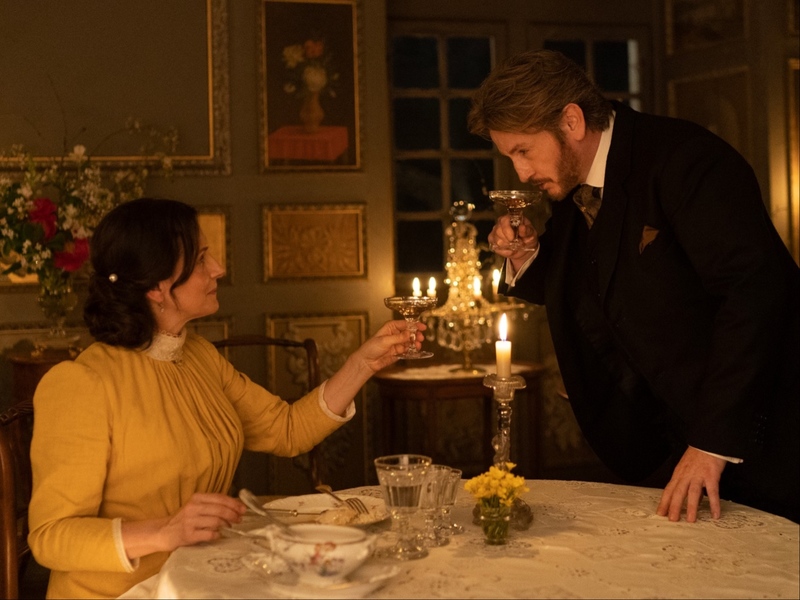When Chicago Tribune film critic Michael Phillips comes up to Milwaukee this weekend, it won’t just be to deliver Saturday’s Milwaukee Film Festival keynote lecture on the state of cinema. The short trip north will also serve as a nice return for Phillips, whose love for film blossomed in some of the theaters the film festival calls home.
"When I was growing up in Racine, Milwaukee was the movie town for me," he explained. "That was where you went to if you wanted to see something before it came to Racine. I spent a lot of evenings at the Oriental watching double bills of Altman and Lina Wertmuller or whatever. And at the UWM Film Society, watching Hitchcock double bills. I was bugging anybody who had a driver’s license at my high school to take me up there.
"Think of it: How long ago was that, that if you didn’t see that film when it came around to the Oriental or the UWM Film Society, you’d have to wait years to see it again? It’s unthinkable now."
Phillips plans to talk about his Milwaukee movie memories – and, most importantly, the state of the movies today. Before then, OnMilwaukee got a little early preview of his thoughts on comic book movies, the importance of the big screen and his "survivor’s guilt" about being the rare employed film critic.
OnMilwaukee: Let’s start with the big question you’re coming to town for: What is the state of cinema right now?
Michael Phillips: There are certain things that become clear to me as I pull this talk together. One, now that we’re all directors, the world is changed forever, and our movie-going tastes have changed forever. We’re all directors because we film so damn much of our lives with our phones, in so many circumstances. And the movies have been aping that idea for quite a few years now. I swear, it’s changed us all in ways we’ve just barely begun to figure out. That’s one enormous difference.
There’s a million other things I don’t think I’ll ever quit wrestling with. Like the idea that it’s so much cheaper now to make a decent looking film with the new digital technology, and it’s so much easier to see the results with any number of our devices, let alone in the hearty few remnants of the 20th century exhibition system – i.e. the movie theater. But that’s no guarantee of quality or vision. I’m concerned that the speed of things and the availability of all of this isn’t really an automatic improvement.
OnMilwaukee: What do you feel is the worst trend going on in Hollywood cinema right now?
Phillips: That’s a good question. There’s something uniquely kind of exhausting about the comic book adaptations, the Marvel universe and all the others. And the strangest thing is that most of these movies are pretty good. And yet, I’m not the only one I’ve heard say I don’t really care if they’re pretty good; I’ve simply had it. Increasingly at the end of these movies – especially the Marvel movies where you get the little postscript tease that sets up the next chapter – you just kind of feel like a little bit of a sucker, and you’re kind of on the hook as a consumer now for the next one since you’ve already committed to the last 13. That’s not a great feeling.
I remember what it was like when the first "Iron Man" came out a long time ago now, and there was a sense of like, "Hey, interesting casting really worked, film was actually light on its feet." And now it just feels like this sort of elephantine inevitability that we’re going to get another Iron Man eventually, because there’s just too much money in it not to.
I worry too that a really good comedy – like "Trainwreck" this summer, which does feel like it’s coming out of a distinctive comic voice’s screenplay – all summer, that film and Amy Schumer were dominating the media coverage so heavily that people were sick of that movie before they saw it. I don’t know what to do about that. That kind of aggressive marketing is the only way a studio can protect an investment, but at the same time, there’s a million movies we barely hear about that are available but we don’t have the marketing dollars to help them penetrate the noise.
And yet – this is where I take some heart from what I’m grateful to do for a living – this is what a critic can do. They can help you find this stuff. It’s as simple as that. I wish I had a more pretentious way of putting it (laughs) but that’s some of the best of what I can do.
OnMilwaukee: With the Marvel movies especially, they’re all of a good quality, but you’re trying to find the bit of personality amongst the branding and the universe-building. When you do, you get something like "Ant-Man," which almost seems like this small little outlier in the universe.
Phillips: Totally, it is, and the fact that it made a little bit of money rather than a ton of money, it’s considered a disappointment. Some of it is just as simple as give me some characters I haven’t seen a million times, which is probably part of the reason why people responding to "Guardians of the Galaxy" I think.
One of the things I hope to talk about a little bit in the keynote is movies are all about time and space, how the director and storytellers fill the time and the space before us. When you compare how action sequences were staged and edited from ten, twenty, fifty years ago to what you often see today, it’s clear that we’re just being flung ever more breathlessly into a rhythm of storytelling that speaks to a very different world. I’m not one of these guys who says all fast-cutting is bad, because when you look at a Paul Greengrass movie, like "United 93" and the second and third Bourne movies, that action is unbelievably frantic and yet it somehow remains lucid and exciting and gripping in a way that keeps one foot in the real world and one foot in the popcorn.
OnMilwaukee: That’s a whole other part of today’s cinema: the growing demand for OnDemand streaming viewing and day-and-date releases.
Phillips: I don’t love that. I’m just too sentimental about seeing movies in a movie theater. There’s no question that it’s only a matter of time before the windows shut altogether, the ones between the theatrical release and the VOD release. Whatever one thinks about "Avatar" or "Gravity," I really enjoyed hearing people say – and on some degree, "The Martian" is somewhat like that too, which is good – I’m glad I didn’t wait to watch this on a 48-inch screen, or worse my laptop, or worse my iPhone.
OnMilwaukee: Yeah, "Iris" is at the festival this year, and it also was just put on Netflix Instant. I always tell people, first of all, this is Albert Maysles’ last movie; you should pay tribute, see him on the big screen. And then, no director has ever said after finishing a movie that he or she can’t wait for people to watch it on their couch off Netflix. They want their work on the big screen.
Phillips: Exactly. Lest we forget, it’s a visual medium. That’s also my complaint about a lot of films and a lot of film criticism. They treat the storytelling like it’s simply on the page. When I go to a movie, I want to find myself in the grip of a director who really had strong ideas how to visualize a story, who know when he or she wanted to move the camera and in what way. And in many ways, we’ve kind of lost the fine art and craft of moving a camera around.
In the old studio days, the camera was very mobile all the time, and not just when it was Max Ophuls and Vincente Minnelli doing these crazy fantastic shots. But just in simple dialogue sequences, when the camera would move instead of cut. These are skills that a lot of directors haven’t the time or the money built into the budget to work out any kind of complicated shot – unless it’s a huge, major Scorsese-type entrance to the Copa in "Goodfellas" type shot.
OnMilwaukee: There’s seemingly only two shots now: standard, flat shots and long takes. That’s all people seem to be interested in.
Phillips: Right. I’m just talking about Michael Curtiz’s shots on the diagonal across the nightclub like in "Young Man with a Horn" or "Casablanca." Those are unbelievably satisfying, and you don’t even know why. There’s nothing flashy about them; you’re not supposed to notice them. You’re just supposed to notice what’s happening with the people in the shot. I don’t know, camera dynamics … we’ll have to rediscover them. Again, that’s one thing I can hopefully do as a critic, what happens when a camera moves a certain way. It does something to our experience of the story being told.
OnMilwaukee: Obviously, the job of a critic has been minimized over the last decade or so. There was a lot of pearl-clutching when The Dissolve disbanded a month or two ago, and conversations about the dearth of employed film critics seem to pop up at least two or three times over the course of a year. Where do you feel about the current state of criticism?
Phillips: There are criminally few paying gigs and tragically plentiful strong critical voices. That’s a really tough situation to be in. I’d lie if I didn’t say that this is sort of my survivor’s guilt at this point, if you’re lucky enough to employed as a full-time film critic in a good situation in a good city. There’s not a day that goes by where I take that for granted. I don’t. There’s a sign above my desk – and there always has been for 30 years wherever I’ve worked – that says, "Be specific and be brave when you write." And everyday, every damn film I see, I try to bring those two things to what I write, because the space is precious, and I’m lucky to be able to fill it.
Michael Phillips' keynote lecture will be hosted at noon on Saturday, Sept. 26 at Kenilworth Square East, room 620. The event is free, but tickets are required.
As much as it is a gigantic cliché to say that one has always had a passion for film, Matt Mueller has always had a passion for film. Whether it was bringing in the latest movie reviews for his first grade show-and-tell or writing film reviews for the St. Norbert College Times as a high school student, Matt is way too obsessed with movies for his own good.
When he's not writing about the latest blockbuster or talking much too glowingly about "Piranha 3D," Matt can probably be found watching literally any sport (minus cricket) or working at - get this - a local movie theater. Or watching a movie. Yeah, he's probably watching a movie.







